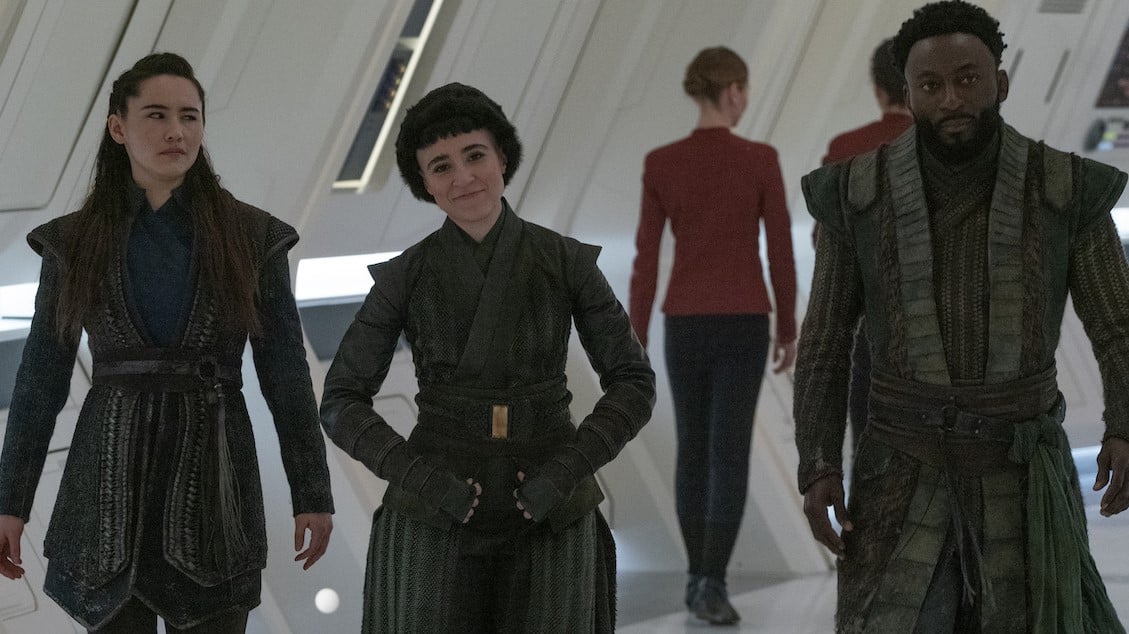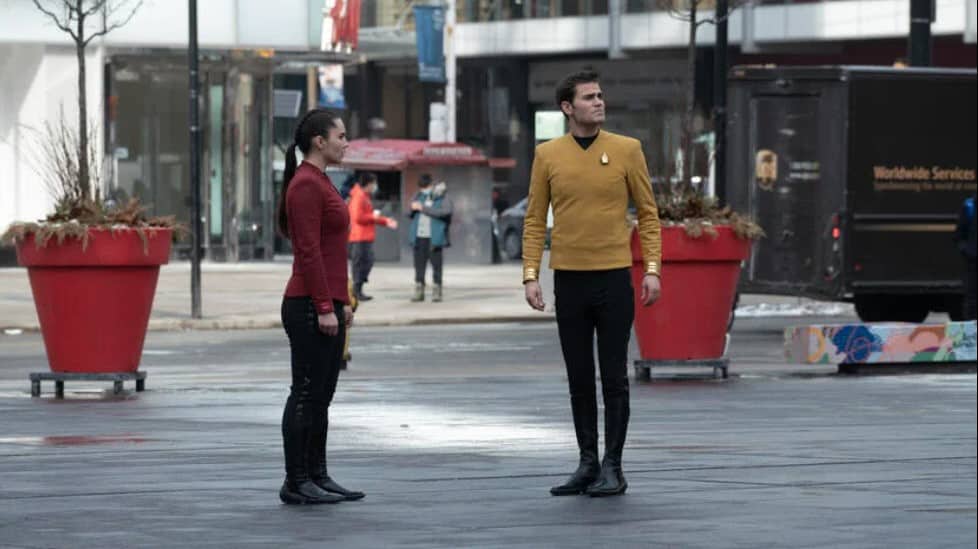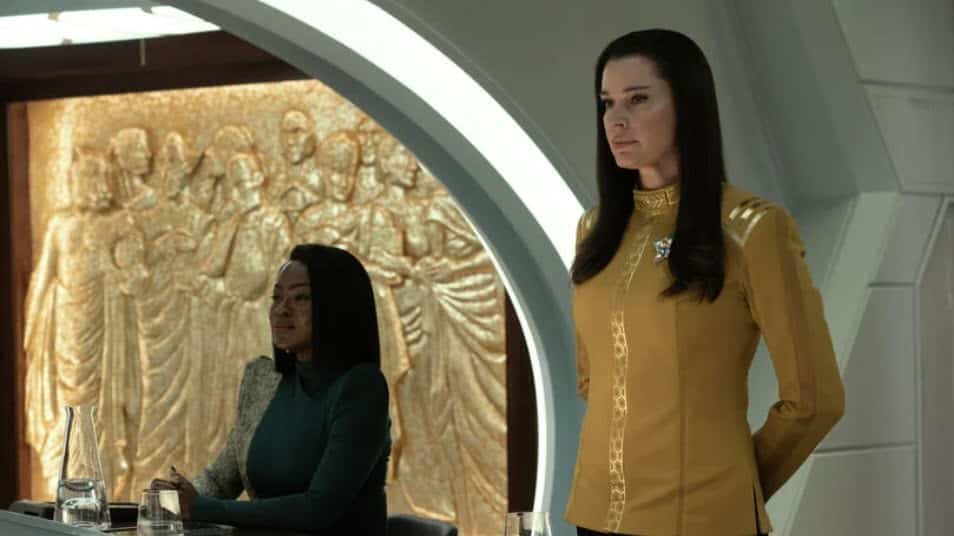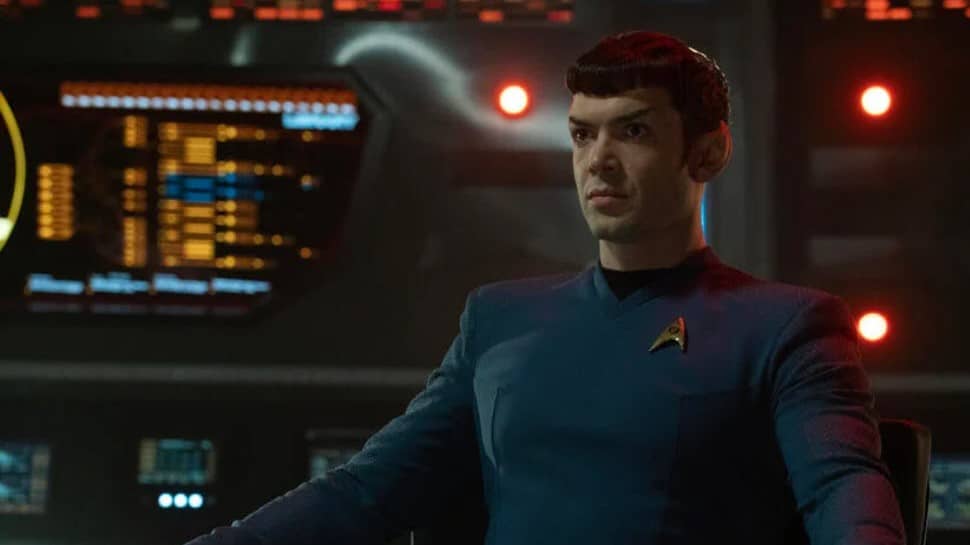While the Enterprise studies a nebula, Dr. M’Benga finds himself trapped in “The Elysian Kingdom,” the fantasy realm of the children’s book he reads to his daughter Rukiya. Written by Akela Cooper and Onitra Johnson, directed by Amanda Row.
Mark Turetsky: Hey Will! So glad you could join me in this fantasy kingdom that my daughter devised. Welcome to Poopytown.
Will Nevin: I…uhh…hope that’s not Flavortown adjacent.
A Flagship LARP
Mark: So here we have it: our Dr. M’Benga episode, with an added bonus Hemmer focus. I was bemoaning the fact that M’Benga’s presence in past episodes seemed to focus mostly on curing his daughter, Rukiya. And it seems like, for better or worse, that’s been resolved. Did you think we’d be getting resolution on that plotline so soon?

Will: That I did not! But I think it was necessary to wrap that up here, giving meat to an episode that — while it might win some awards for costume design and had Anson Mount ONCE AGAIN showing he can do anything — didn’t have much else to it of substance. It was a holodeck episode without the holodeck. “Q-pid” without Q.
Mark: I agree for the most part. I also thought just about everybody got a chance to shine, playing mostly against type. The biggest letdown for me was Ortegas as the noble knight/straight man Sir Adya to Captain Pike’s funny lickspittle Sir Rauth. I don’t know if it’s because Ortegas hasn’t had much to do elsewhere, or if Sir Adya was underwritten, but it just didn’t work for me. On the bright side, I think this episode did a lot to give us a better idea of who Hemmer is as a person. Prior to this I would have characterized him as something of a stick-in-the-mud, but here he seemed to be having some fun playing the wizard Caster.
Will: Ortegas is a charming and even funny character but not necessarily a zany one — and that latter part is where the comedy/amusement comes in seeing a fresh actor take on a straight man role (say, for example, Will Ferrell in The Other Guys). And you’re definitely right with Hemmer — he’s much more Robert Picardo’s The Doctor from Voyager rather than Michael Dorn’s TNG Worf. There’s a formality, a certain grumpiness, but there’s also a dry wit. And as we saw in the conclusion, a real heart.

Mark: I’m also wondering if what we’re seeing is an effect I’m familiar with from the acting world: play-acting as someone else often allows you to tap into sides of your personality that you don’t often show to others. With Hemmer being forced to play-act in this fantasy world, he’s allowing himself to cut loose a little bit. It’s also interesting to me that, in addition to our main cast, Lieutenant Mitchell is also given a fairly prominent role as the head of Uhura/Queen Neve’s guard. If I were to guess which of the recurring cast would get to play along with the fantasy LARP, I would have guessed Sam Kirk. Not complaining or anything, just observing that we haven’t really gotten as much of him as the first few episodes might have suggested.
Will: I get the sense that Sam Kirk was only around to tease the idea of the other Kirk based on how little he’s been used. I can think of, what, two moments he’s been around? That said, I think he would have been fine as Sir Adya or Sir Rauth — if only because that mustache plays either way.
Mark: For the most part, I think there are some comedic pacing issues. There are a few moments, like where Una’s Z’ymira the huntress suggests shooting Dr. M’Benga full of arrows, followed by an exchange with Ortegas/Adya that just kind of fell flat. It could have used some work to really find the comedy in that moment and develop it. Instead, it’s written funny, and the concept is funny, but it could have used just a bit more work to really make the gag shine. Maybe some more rehearsal, or editing choices.
Letting Go
Mark: But I think at this point, there’s a big elephant in the room that we haven’t been talking about. And that’s the ending. What’d you make of the resolution to this episode, and to Dr. M’Benga’s race against time plotline as a whole?

Will: Well, for starters, I cried like a big dumb baby. It was an incredibly touching scene — a parent faced with the uncertain prospects of continuing extraordinary measures on a child who was clearly unhappy versus letting that child go forever. I might have problems with the rest of the episode (pacing was sketchy and it simply went on for too damned long) but the resolution was the best that science fiction has to offer in that it featured both a real human problem and gave us a fantastical solution as M’Benga had the peace of knowing he made the right decision.
Asking whether the end made the episode worth it is probably the wrong question to ask (since Mount absolutely made the fantasy stuff worth anyone’s time), but the answer is yes.
Mark: So, for me, the ending didn’t quite land. First, it has a real believability issue: what kid would choose to run off with a near-total stranger and not to be with their remaining parent (leaving aside cases of abuse)? It also doesn’t seem like such an obvious solution. M’Benga knows there’s a cure to be found, he’s even got proof that it can be done, and some breadcrumbs as to how to develop the cure. The telling thing for me is that the ending depends on Rukiya coming back as an adult to tell him he’s done the right thing. Let’s imagine she doesn’t come back: then you’ve got a sad ending where she’s, for all intents and purposes, dead. Let’s say she comes back briefly at the same age: then you have the issue of no time having passed, there’s no reassurance to be found there. But what we have is, essentially, some kind of afterlife spirit reassuring him that he made the right call. It just doesn’t sit well with me. Maybe it’s because I have a daughter of my own and don’t want to engage with these kinds of questions, I don’t know.
Will: This is very much (to me) an allegory about end-of-life care and death, and it makes me think about a point my father always used to emphasize: quality of life versus quantity of life. M’Benga, to my reading of the story to this point, doesn’t have the cure in hand — he feels that it’s out there, he thinks he can develop it, but it’s not a certainty. And of course, he has to rematerialize her every so often, which only advances the spread of her cygnokemia. Meanwhile, Rukiya is in a miserable limbo. In the real world, we don’t get to know whether we made the right choice, whether (like Dr. McCoy unfortunately found out, as he explained in Final Frontier) there was truly a cure to be had. Without Rukiya coming back, you’re right — we do get a really sad ending. But I think the audience deserved this. We earned some emotional peace. As a treat.
Mark: I agree that it works on that level, it just seems like the episode is trying to eat its cake and have it too. If it’s about a parent making a heartbreaking decision, then having that reassurance come afterward undercuts it. It would make for an exceptionally bleak episode, though, so I dunno.
Will: As much as I appreciated the relatively happy ending, I wonder if the downer you’re describing might have been the overall better choice. If M’Benga is going to carry this moving forward — and actor Babs Olusanmokun has said as much — then maybe he should have the emotional weight of not knowing if he made the right call.
Mark: I think we can both agree that Olusanmokun did a tremendous job on this one.
Will: 100 percent. Again, even when SNW kinda misses, it doesn’t miss by much.
Stray New Words
- As has been pointed out elsewhere, The Kingdom of Elysian is written by Benny Russell, the author that Ben Sisko dreamed about in one of the best Trek episodes ever, Deep Space Nine’s “Far Beyond The Stars.” In it, Russell writes short stories about Deep Space Nine, calling into question whether the entire Star Trek franchise was the imaginings of a 1950s sci-fi author. Establishing him as having existed in Trek’s history raises some serious existential questions.
- That’s a much better addition to canon than Picard bringing Rick and Morty into the Trek universe. [WN]
- I could have done without the flashes to book illustrations every time a new character showed up. After the first few, we get it.[MT]
- A Boltzman brain is not theoretical. It’s a thought experiment about probabilities. (ie, what’s more likely: a brain forming out of nothing, with memories of having existed, or an entire universe forming all on its own?)
- Along with the Crushers, we’ve now had two Trek CMOs have kids onboard who ascended to some kind of nebulous godhood.
- Rukiya had the decency to leave without ruining a single episode. [WN]
- Pike’s hair has actually been getting bigger. I guess they don’t have a barber aboard.
- Funny that the two alien characters (leaving out Una, who is human-passing and whose alien status is a secret) are cast as brothers.
- Next up: John Carpenter’s The Thing! But make it Star Trek!






